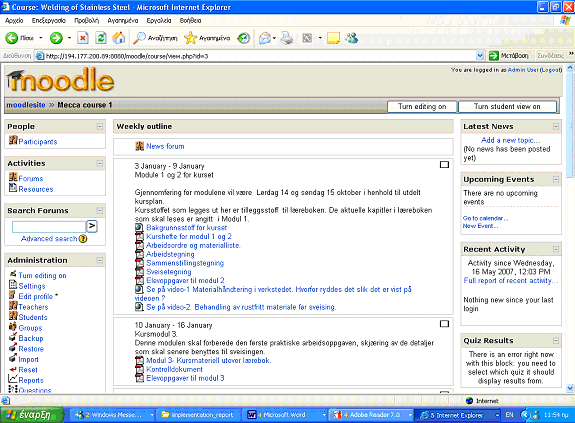Moodle
Moodle is an alternative to proprietary
commercial online learning solutions, and is distributed free under open
source licensing. Moodle’s modular design makes it easy to create
new courses by adding content that will engage students.
Moodle was designed with “social constructionist” principles
in mind. Constructivism asserts that people construct new knowledge while
they interact with their environment. From the other side Constructionism
asserts that learning is effective when someone uses its experience in
order to construct something for learners, either it is very simple like
a spoken sentence, either it is very complex like a software package.
The concept of social constructivism extends the above ideas into a social
group constructing things for one another, collaboratively creating a
small culture of shared artifacts with shared meanings.
Moodle gives the opportunity for teachers to create their own courses,
providing a lot of features for course management. The most important
of them are:
- forums: threaded discussion boards for asynchronous group exchange
on shared subject matter.
- chat: real-time synchronous communication between learners.
- assignment: used to assign online or offline tasks; learners can submit
tasks in any file format (e.g. MS Office).
- choice: creation of multiple-choice questions that are used for quick
surveys on subject matters.
- journal: record learners’ reflection and revise ideas.
Also Moodle provides a lot of features about learner management. The
most important of these features are:
- groups: group categories where teachers have the possibility to determine
how members can interact with each other and within various activities.
- calendar: a typical calendar of events.
- scales feature: it is used for grading forums, assignments, journals.
- grades feature: provides a view of all forum, assignment and journal
grades.
- logs: monitor when and what course resources the learner has accessed.
In the following picture a home page of a course created in Moodle is depicted:

Moodle is a very popular learning management system, while over 1150
organizations have registered moodle sites by April 2004. This number
increases continuously while teachers find out the advantages of implementing
open source learning solutions. For more information visit: moodle.org/doc
|

